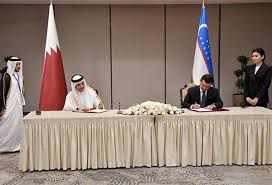phone
phone
Uzbekistan and the State of Qatar: A Strategic Partnership Oriented Toward the Future

Uzbekistan and the State of Qatar: A Strategic Partnership Oriented Toward the Future
In recent years, cooperation between the Republic of Uzbekistan and the State of Qatar has gained a dynamic and strategic dimension, encompassing trade, investment, energy, infrastructure, and humanitarian sectors. The dialogue between the two nations is built on mutual trust and shared interests aimed at diversifying their economies, strengthening their positions in global markets, and ensuring sustainable development.
A Strong Legal and Institutional Foundation
The foundation of the Uzbekistan - Qatar partnership rests on a robust legal framework. Key intergovernmental agreements - including the 2010 Doha agreement on trade, economic, and technical cooperation, and the 2023 Samarkand agreements on mutual protection and promotion of investments, avoidance of double taxation, and customs cooperation - have established a solid basis for a new stage of engagement.
Equally important are the memoranda and agreements between sectoral institutions: the Memorandum of Understanding between the Ministry of Investment, Industry and Trade of Uzbekistan and the Ministry of Commerce and Industry of Qatar; the cooperation agreement between the Fund for Reconstruction and Development of Uzbekistan and Qatar Holding; as well as arrangements with Qatar Petroleum International and Nebras Power in the energy sector.
These documents create the legal and institutional groundwork for deepening cooperation, establishing a Joint Business Council, and strengthening the role of the Chambers of Commerce and Industry of both countries.
Trade and Economic Cooperation
Uzbekistan and Qatar have established a most-favored-nation trade regime. In the first nine months of 2025, trade turnover increased by 45% compared to the same period last year, while Uzbekistan’s exports grew more than 2.7 times.
Uzbekistan’s exports are primarily composed of industrial goods (48%), services (33%), and mineral fuels (12%). Imports from Qatar mainly consist of chemical products and mineral raw materials, reflecting significant potential for supply diversification and deeper cooperation in processing and high-tech industries.
Investment Partnership: Focus on Green Energy and Innovation
Qatar has emerged as one of Uzbekistan’s priority partners for attracting foreign direct investment. Following the 2023 visits of His Highness Sheikh Tamim bin Hamad Al Thani, Emir of Qatar, to Samarkand, and President Shavkat Mirziyoyev to Doha, both sides agreed to implement large-scale projects in the energy, gas-chemical, logistics, agriculture, IT, and tourism sectors.
By 2025, an investment portfolio of 28 projects worth a total of $7.6 billion has been formed, including $2.1 billion in energy initiatives involving Nebras Power, as well as infrastructure projects in transport, healthcare, and digital development.
Qatari companies are particularly interested in developing logistics hubs, export terminals, and industrial zones—especially within Uzbekistan’s free economic zones. Joint renewable energy projects reflect the shared commitment of both nations to sustainable growth and a green transition.
Institutional Dialogue and Expanding Horizons
The Intergovernmental Commission on Trade, Economic, and Scientific-Technical Cooperation plays a vital role in facilitating bilateral relations. Its 2024 and 2025 sessions gave strong momentum to the practical implementation of agreed initiatives.
Regular contacts between ministries, business councils, and industry associations enable systematic promotion of new projects and direct engagement between the business communities of both countries.
Looking Ahead
Uzbekistan and Qatar are entering a new phase of strategic partnership, where traditional areas of cooperation are increasingly complemented by innovation and technology.
The key intersection of interests lies in the mutual aspiration to build next-generation economies - diversified, sustainable, and innovation-driven. For Qatar, under the Qatar National Vision 2030, priorities include the development of non-resource sectors, green technologies, and human capital. Uzbekistan, implementing the Uzbekistan 2030 strategy, emphasizes industrialization, digitalization, decarbonization, and private sector expansion. These strategic visions provide a natural foundation for synergy and knowledge exchange.
Promising Areas of Cooperation
- Energy and Hydrogen Technologies: The sides are exploring joint solar and wind power projects. Qatar offers strong expertise in LNG and energy infrastructure, while Uzbekistan provides resource potential and favorable climatic conditions for renewable energy.
- Transport and Logistics: The connection of Central Asian and Gulf transport corridors offers opportunities to establish a “Uzbekistan–Caspian–Gulf” corridor as part of global East–West connectivity.
- Agro-industry and Food Security: With Qatar’s growing demand for agricultural imports and Uzbekistan’s technological strength in processing, irrigation, and crop breeding, there are promising prospects for sustainable agro-partnerships, including greenhouse complexes and joint food production ventures.
- Information Technology and Digital Transformation: Qatari investment funds are interested in IT clusters and startup ecosystems in Uzbekistan, which offers a favorable regulatory environment and strong human capital. Joint projects in fintech, cybersecurity, and smart cities can become new growth drivers.
- Healthcare, Education, and Tourism: Cooperation in these humanitarian spheres builds a bridge between peoples. Establishing medical centers with Qatari participation, academic exchanges, and development of Islamic and eco-tourism add a human dimension to bilateral relations.
- Financial Cooperation: Dialogue is ongoing to engage Qatari funds and banks in financing Uzbekistan’s infrastructure and export projects, as well as in deploying Islamic finance instruments (sukuk, istisna, ijara) within green and social initiatives.
Together, these areas form a new architecture of Uzbekistan - Qatar engagement - one that shifts the focus from trade toward sustainable investment, joint production, and integration into global value chains.
Thus, the partnership between Uzbekistan and Qatar stands as a model for contemporary cooperation between Central Asia and the Middle East - pragmatic, technology-driven, and mutually beneficial. It is based not on situational interests but on a deliberate long-term strategy, where both sides aim to transform the region’s geo-economic potential into tangible instruments of growth and prosperity.
Deputy Minister of Investment, Industry and Trade of the Republic of Uzbekistan Shokhrukh Gulamov








